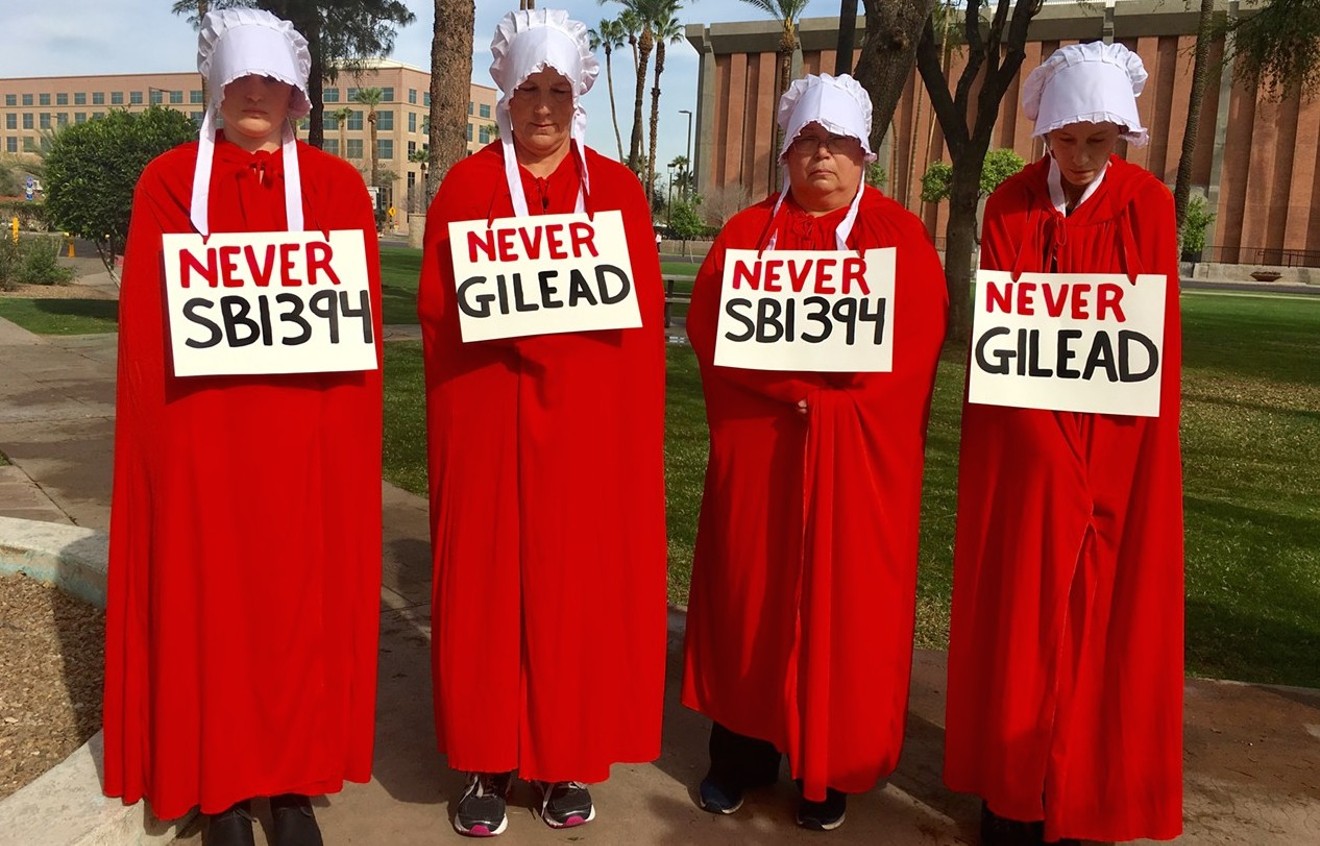Arizona isn't far behind. Governor Doug Ducey has signed every anti-abortion bill that's been put before him, including a law requiring providers to ask women why they are getting an abortion. Next to Alabama, Arizona has some of the most restrictive abortion laws in the country, like a 24-hour waiting period for women seeking abortions, requiring them to make two trips.
Here's a recap of what Arizona lawmakers have done to restrict abortion access:
1. Just this week, lawmakers introduced a bill to give $7.5 million to an anti-abortion group.
The bill, HB 2759, would appropriate $2.5 million annually for the next three years for a “family health pilot program” whose purpose “is to encourage healthy childbirth [and] support childbirth as an alternative to abortion.”
It specifically states that the funding “may not be used for abortion referral services or distributed to entities that promote, refer or perform abortions.” The bill is sponsored by Republican Representative Michelle Udall and co-sponsored by all 30 other Republicans in the House...
...The sole purpose of the Texas-based Human Coalition, to which lawmakers were told the $7.5 million would be directed, is to prevent women from having abortions.
On its website, it claims to “[operate] six ‘lab-driven’ divisions in key abortion-dense cities” and to “[serve] and [support] over 45 pro-life pregnancy centers across the country with our marketing and contact center services.”
2. Last year, Ducey signed a bill requiring doctors to ask women seeking an abortion if they were raped.
Doctors will soon be required to ask women seeking an abortion in Arizona whether their pregnancy is the result of rape or incest, and if they've experienced domestic violence or human trafficking.
On Friday, Governor Doug Ducey signed Senate Bill 1394 into law. The highly controversial bill was backed by the anti-abortion Center for Arizona Policy, but opposed by the American College of Obstetricians and Gynecologists and the Arizona Coalition to End Sexual and Domestic Violence.
3. In 2015, AZ lawmakers passed a law requiring doctors to tell women that medication-induced abortions can be reversed, which isn't true.
A new law requiring doctors to tell women that medication-induced abortions can be reversed — a premise most of the health care community refutes — could be in violation of the First Amendment, experts say.
The U.S. Supreme Court in 1992, in Planned Parenthood v. Casey, ruled that, in the interest of informed consent, it was constitutionally permissible for states to compel physicians to provide women with truthful information that may encourage them to reconsider a decision to have an abortion. Based on the ruling, 35 states mandate counseling. Twenty-seven detail exactly what doctors must say.
The Pennsylvania law examined in Planned Parenthood v. Casey, however, stipulated that women be informed about fetal development, alternatives to abortion, and the risks of pregnancy. In recent years, the types of things legislators are asking doctors to tell women have changed, says Elizabeth Nash, a policy analyst at the Guttmacher Institute, a pro-choice think tank based in New York. "Now, more and more, we're seeing unsubstantiated science," Nash says.
4. Former governor Jan Brewer signed a bill allowing warrantless searches of abortion clinics in 2014.
Governor Jan Brewer has signed a bill that allows the state health department to search abortion clinics without an administrative warrant.
Brewer didn't make any public comments on her signing of the legislation, House Bill 2284.
The bill is one of three bills backed by the Religious Right organization Center for Arizona Policy that have been passed by lawmakers.
5. In 2011, lawmakers introduced a bill that would force doctors to show women ultrasound images before getting an abortion.
Several members of the Arizona State Legislature want to force doctors to offer to show women seeking an abortion ultrasound images of the fetus before they end their pregnancy.
Supporters of the bill, introduced by Republican Representative Kimberly Yee of Phoenix, say it's designed to give women more information about abortion, when in reality its goal is to scare women into changing their minds.
The bill is just one of several bills introduced this year — by all the usual pro-life suspects in the state legislature — that add bizarre requirements for doctors who provide abortions.
Representative Steve Montenegro, who's also signed on to this bill, introduced two bills this year that would make getting an abortion based on race or gender a felony. As we learned yesterday, there's no evidence that anyone getting abortions based on either of those reasons is a problem in Arizona.











